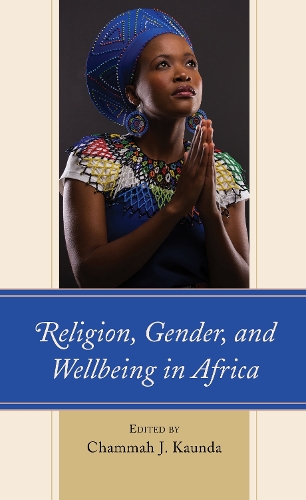
Religion, Gender, and Wellbeing in Africa
(Hardback)
Publishing Details
Religion, Gender, and Wellbeing in Africa
By (Author) Chammah J. Kaunda
Contributions by Kudzai Biri
Contributions by Elias Kifon Bongmba
Contributions by Lucy T. Chibambo
Contributions by Sinenhlanhla Sithulisiwe Chisale
Contributions by Rachel NyaGondwe Fiedler
Contributions by Julius Gathogo
Contributions by Sokfa F. John
Contributions by Chammah J. Kaunda
Contributions by Esther Lubunga Kenge
Bloomsbury Publishing PLC
Lexington Books
11th May 2021
United States
Classifications
Professional and Scholarly
Non Fiction
Gender studies, gender groups
200.82096
Physical Properties
Hardback
246
Width 164mm, Height 228mm, Spine 24mm
558g
Description
Religion, Gender, and Wellbeing in Africa argues that, in many African societies, ideas and practices of wellbeing and gender relations continue to be informed and shaped by religious epistemologies. The contributors affirm that for many Africans, it is through religio-spiritual frameworks that daily experiences, interactions, and gender relations are understood and interpreted. However, for many African women, religions have functioned as a double-edged-sword. Although they have contributed to the struggle against issues such as colonialism, gender justice, climate justice, and human rights, they have also endorsed and perpetuated sexism, heterosexism, homophobia, and the denial of human rights for a wide variety of people on the margins. The chapters within this collection demonstrate that most religions and religious formations in Africa have not yet positioned themselves as forces for wellbeing, gender justice, and security for African women and children. The contributors challenge simplistic and superficial readings and interpretations of religio-spirituality in Africa and call for deeper engagements of the interplay between Africas religio-spiritual realities and the wellbeing of women, particularly around issues of gender justice, reproductive health, and human rights.
Reviews
Currently, when the whole world is under the blow of a deadly pandemic, this remarkable book, which points to questions of religion, gender and wellbeing in Africa, is a hope. It helps to understand and to address in context the evolution of COVID-19 like that of other diseases, as well as various challenges that prevent the full development and the blooming of vulnerable people of all sexes especially the elderly, women, and children.
The richness of this book is that it brings together the reflections of various authors from several African countries on hot and various topics. They are knowledgeable about their backgrounds and take seriously the desire of their people to live better life. They scrutinize the complexity and multifaceted challenges that unfold in their diverse cultures and sift them through the liberating Gospel before proposing appropriate solutions.
There are writings of this kind, but this one, written in honour of Prof. Isabel Apowa Phiri, is a real wealth, and I highly recommend reading it. Working methodology based on experiences and which lead to solutions adapted to the African context are deployed. The authors offer useful trajectories, such as open doors to hope.
--Priscille Djomhou, Faculty of Protestant Theology in BrusselsReligion, Gender, and Wellbeing in Africa interrogates pertinent public health and wellness issues which affect the African continent, such as HIV/AIDS, COVID-19, and gender-based violence, as reading lenses to interrogate and debunk the gendered nature of the health crises in Africa. The volume challenges, resists, and exposes the patriarchal and toxic masculinities and femininities which are embedded in African religions, spiritualities, and cultures. The contributors commit to articulating and proclaiming life-giving, health-conscious, women-affirming worldviews, theologies, and interpretations of sacred texts. A must-read for scholars, students, and the laity interested in studies on the intersection between religion(s), (African) women, and health issues.
--Puleng LenkaBula, University of South AfricaAuthor Bio
Chammah J Kaunda is assistant professor at the United Graduate School of Theology, Yonsei University, Korean Republic and research fellow for the Southern African Institute for Policy and Research (SAIPAR).
